Gay Best Friend: Erich in "Midnight Express"
 Monday, March 8, 2021 at 1:00PM
Monday, March 8, 2021 at 1:00PM a series by Christopher James looking at the 'Gay Best Friend' trope
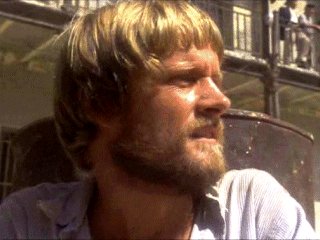 Norbert Weisser co-stars as Erich in Alan Pakula's 1978 hit "Midnight Express."Our journeys into classic cinema has allowed us to explore the beginnings of the gay best friend trope and coding during the Hayes Code. Once the code was abolished, the late 60s and 70s were able to go wild. While sex, swearing and violence began to populate films, the depiction of gay people stayed relatively the same. Movies were able to actually define characters as LGBTQ+, but they were often villains or would meet a tragic fate. Sympathetic LGBTQ+ characters were tough to come by.
Norbert Weisser co-stars as Erich in Alan Pakula's 1978 hit "Midnight Express."Our journeys into classic cinema has allowed us to explore the beginnings of the gay best friend trope and coding during the Hayes Code. Once the code was abolished, the late 60s and 70s were able to go wild. While sex, swearing and violence began to populate films, the depiction of gay people stayed relatively the same. Movies were able to actually define characters as LGBTQ+, but they were often villains or would meet a tragic fate. Sympathetic LGBTQ+ characters were tough to come by.
At first glance, the brutal prison drama Midnight Express would not seem like the place to find a nice gay best friend. But Erich (Norbert Weisser) stands out as a light among the considerable darkness. Erich acts as the confidant and guide for our protagonist, Bill Hayes (Brad Davis in a BAFTA & Globe nominated debut), who was sent to this Turkish prison for smuggling hashish from Turkey. His kindness is a wonderful tonic for the grim realities of the Turkish prison.
However, once Erich acts on his desires, he is immediately removed from the narrative...
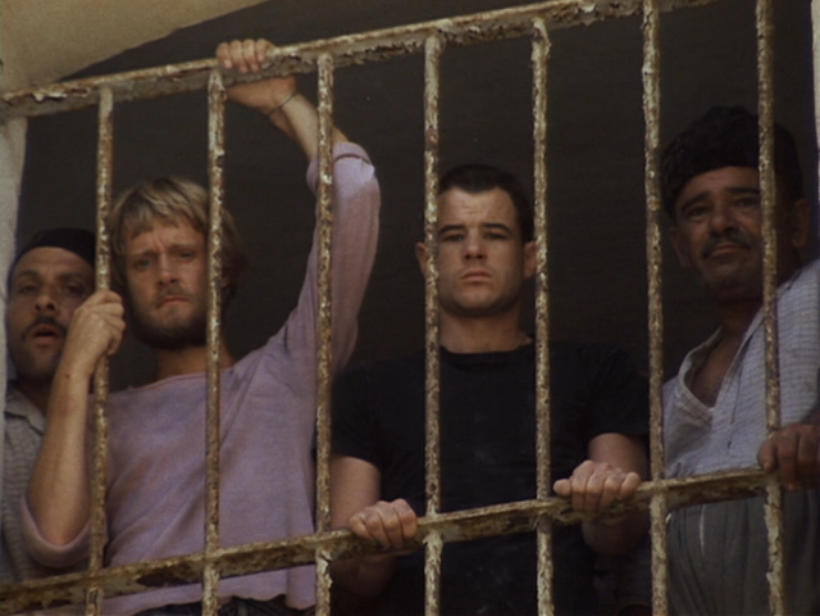 It's not quite the Cell Block Tango, but Erich is the friendly soul to teach Billy (Brad Davis) the ways of the Turkish prison.
It's not quite the Cell Block Tango, but Erich is the friendly soul to teach Billy (Brad Davis) the ways of the Turkish prison.
Billy Hayes: What about you? What are you in for?
Erich: Hashish. 90% of the foreigners here are in for hashish or drug related charges from smuggling to possession. My advice is you get yourself a very good lawyer and try to argue down the charge you face. If they make it possession, the sentence is lighter.
Billy Hayes: What were you convicted of?
Erich: Smuggling hash with the intent to sell.
Billy Hayes: What sentence did you receive?
Erich: 12 years. I've been here for just over four years.
Billy Hayes: How much did you have on you?
Erich: 100 grams.
There’s a lot that connects Billy to Erich upon his entrance. We meet him the same time we meet Jimmy (Randy Quaid), a wild child compared to Erich’s calm pragmatism. He quickly establishes himself as Billy’s main ally and confidant, while Jimmy and the heroin addicted elder, Max (John Hurt) are the more erratic members of their prison clique. At this point, we don’t know anything about Erich’s sexuality. All we see is the connection forming between him and Billy over their shared temperament, ideology and crimes.
Billy Hayes: [voiceover] To the Turks, everything is "shurla burla", which means "like this, like that". You never know what will happen. All foreigners are "ayip", they're considered dirty. So is homosexuality, it's a big crime here, but most of them do it every chance they get. There are about a thousand things that are "ayip", for instance, you can stab or shoot somebody below the waist but not above because that's intent to kill. So everyone runs around stabbing everyone else in the ass. That's what they call Turkish revenge. I know it must all sound crazy to you, but this place is crazy.
For as dark and gritty as the movie is, the male gaze comes in fits and starts. Maybe it’s just easy to thirst over Brad Davis early on when he is strip searched after being detained at the airport. However, as this voiceover suggests, it knows homosexuality is everywhere, even though it's frowned upon. At this point, we have no indication that any characters are gay. Yet, the movie takes place in an all male prison. There is at least gay sex going down somewhere. That homosexuality is this open secret that is condemned, yet accepted, reflects the general sentiments of the 70s. They had to tsk tsk at homosexuality in film, even though off-screen, Hollywood figures were participating in the wild and open 70s.
All of this leads into the film’s “exclusively gay moment.”
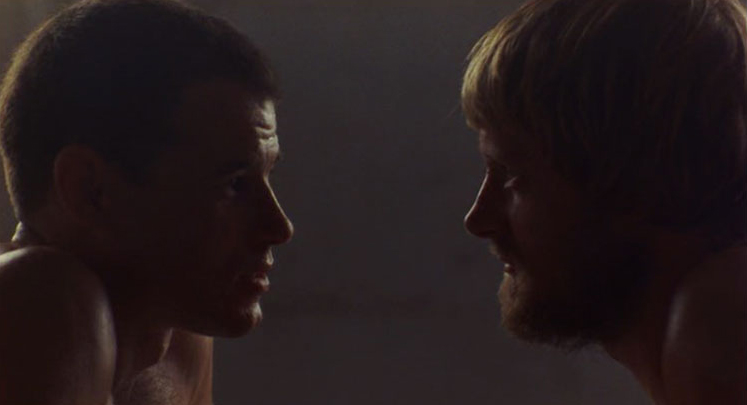 Don't you look at all your platonic male best friends this way?
Don't you look at all your platonic male best friends this way?
Billy Hayes, Erich: Prison, monastery, cloister, cave. Prison, monastery, cloister, cave. Prison, monastery, cloister, cave. Prison, monastery, cloister, cave.
Erich leads Billy in yoga, chanting together the above quote. The camera lingers on each of the men’s bodies as they contort in unison. It’s incredibly sexy from the get go. As the camera zooms in on their faces, they’re totally in sync. You can feel their lips almost move towards each other, but no one makes the first move. Cinema had been filled with so many versions of the “villainous gay” that lusts after a protagonist or tries to tempt the “manly man.” However, that sort of subtext is absent. It looks like two men earnestly being turned on by one other.
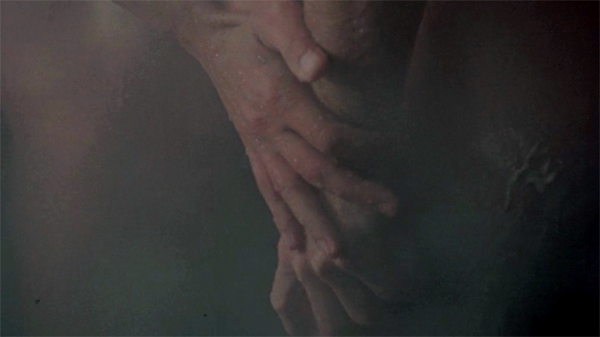
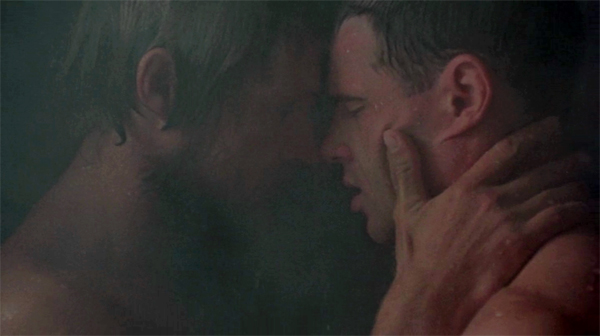
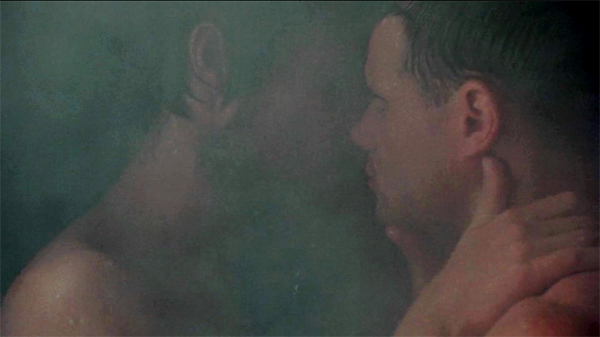
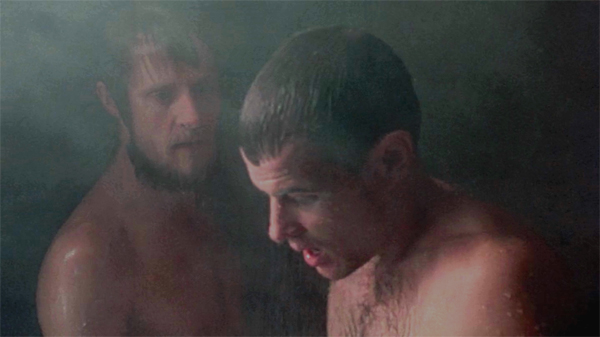
The scene moves into the shower. It’s completely dark, with only the steam rising between their naked bodies. You can feel them move together to engage in sexual relations. Erich makes the first move, but then Billy turns around and leaves. The camera lingers on Erich’s saddened face, rejection reading clearly on his face. What’s so interesting is Billy completely reciprocates the interest up until abruptly leaving. This wasn’t a sinister gay luring a straight man into a sexual encounter. Billy leans in to the sexual encounter, kissing Erich. It feels as if the movie wants to have empathy for Erich and acknowledge a positive and sexual relationship that happened during prison. Yet, it’s cut short to be more mainstream or accessible? This shower sequence was covered previously covered in the "April Showers" series where the scene is also questioned. The movie goes so far to confirm that Billy was attracted to Erich, so why do screenwriter Oliver Stone & director Alan Parker have him walk away?
The real-life Billy Hayes confirms he had homosexual relationships within the prison, as detailed in his book of the same name. In an article in The Guardian, Hayes expressed his dissatisfaction with the rejection in the shower scene. “I wish that they’d let the steam in the shower come up and obscure the act itself instead of showing a rejection,” he said.
Hayes also publicly critiqued the film for its one note depiction of the Turkish guards. In a guest column at Variety, Hayes claims that he did not kill a Turkish prison guard, which is the climactic moment that allows him to escape in the film. That scene is also loaded with fear of gay sex, as the guard, Hamidou (Paul L. Smith), is seen unbuckling his pants to rape Billy. This snaps Billy into action, as he pushes Hamidou into the wall, where a coat-hanger pierces the back of his head and kills him. The film is loaded with depictions of toture and abuse throughout. Thus, it feels strange that this apparently purely invented scene was the “new low” that spurred Billy into action.
Stone won an Oscar for his adaptation of Hayes’ book. There’s certainly a lot of craft that went into the film. Under Parker's direction, the movie consistently entertains and Brad Davis gives a great performance as Billy Hayes. Yes, changes have to be made in order to turn a book or true story into a film. While Stone makes many choices that created a thrilling and satisfying movie, these choices always appear to be under the umbrella of making things more palatable for American audiences at the time. The thrilling escapes and colorful prisoners could have all stayed intact, even they had given Erich and the guards more dimension.
Ultimately, it’s fitting that the last image we see of Erich is a dejected look after Billy refuses his advances. The minute Erich makes his desires known, he’s jettisoned from the movie for his crime of being gay. Queers don’t get to be included on late night escape attempts through the catacombs.
Previously in Gay Best Friend
- Plato (Sal Mineo) in Rebel Without a Cause (1955)
- Sebastian Venable in Suddenly Last Summer (1959)
- Calla Mackie (Estelle Parsons) in Rachel Rachel (1968)
- Toddy (Robert Preston) & Squash (Alex Karras) in Victor/Victoria (1982)
- Sammy Gray (Steve Zahn) in Reality Bites (1994)
- Gareth (Simon Callow) and Matthew (John Hannah) in Four Weddings and a Funeral (1994)
- George Downs (Rupert Everett) in My Best Friend’s Wedding (1997)
- George Hanson (Paul Rudd) in The Object of My Affection (1998)
- Bill Truitt (Martin Donovan) in The Opposite of Sex (1998)
- Robert (Rupert Everett) in The Next Best Thing (2000)
- Patti (Sandra Oh) in Under the Tuscan Sun (2003)
- Nigel (Stanley Tucci) in The Devil Wears Prada (2006)
- Wallace Wells (Kieran Culkin) in Scott Pilgrim vs the World (2010)
- Abby Gerhard (Sarah Paulson) in Carol (2015)
- Duncan (Pete Davidson) in Set It Up (2018)
- Jack Hock (Richard E. Grant) in Can You Ever Forgive Me (2018)



Reader Comments (4)
I found this a deeply offensive film all around, The homophobia really stood out, but the racism towards the Turks was even more despicable.
amy -- i havn't seen this one in a long time but i remembr it making me uncomfortable and so i dont doubt it.
christopher -- thanks for this continuing series and thanks for shouting out that shower scene article. That scene makes me so crazy and this is apparently what you get when you put straight men in as the writer/directors of a true story about a guy who didn't seem to have hang ups about the fluidity of sexuality. but the filmmakers sure did!
ALAN PAKULA did NOT direct this movie. It was ALAN PARKER.
The representation of Turks in this movie literally makes my Turkish boyfriend literally seeth with anger, and I know the real-life Bill Hayes actually detested its treatment of the Turkish people.